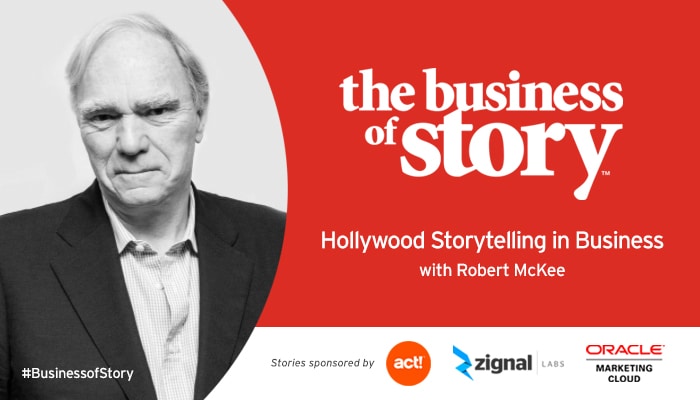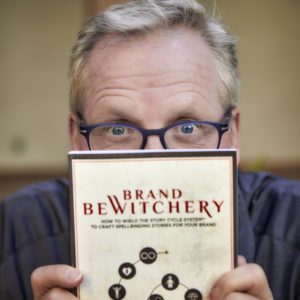Learn from legendary screenwriting coach, Robert McKee, how to become a better business communicator on the current episode of Business of Story podcast.
Three years ago I spent four days in a dark and freezing Sheraton LAX ballroom with Robert McKee.
I was one of nearly 250 people in attendance, most of them aspiring screenwriters. But I was there to learn from Hollywood how to become a more persuasive leader, brand strategist and content marketer through the stories I tell.
“If your cell phone goes off during my seminar, you will come up here to my stage and give me $10 in front of all of your screenwriting pals. If it goes off a second time, you’re kicked out. Because one ring is an accident. The second one tells me you’re an asshole.”
That’s how McKee warmly opened his Story screenwriting seminar. The man is a force of nature. This clip from the movie Adaptation, where actor Brian Cox portrays McKee, only slightly exaggerates his zest for his craft.
Here are a few of my favorite McKee quips and the insight they provide marketers who embrace storytelling as the most powerful form of persuasion.
1. “Story is about trying to make sense out of the confusion, chaos, and terror of being human.”
McKee said that people are not on journeys. “Journey” is a euphemism for the truth that life is a battle or war. He stressed, “Purge euphemisms from your vocabulary, because they separate you from reality.” Does your brand speak the truth or is your story obfuscated by jargon?
2. “You need to understand your characters in a God-like way.”
I learned that Hollywood will spend $1 billion this year on approximately 50,000 screenplay treatments that will never be made. Only one out of every 100 scripts makes it to the screen. McKee pointed to the roughly 250 screenwriters in the seminar and said only 2.5 writers will succeed out of the bunch. The primary reason for success is the amount of time and energy a writer must invest in researching characters to understand them and their environment in a “God-like way.” “Most of you are too lazy to do it,” he observed. How well do you know your customer, the protagonist in your brand story?
3. “People think that facts are the truth. Facts are neutral. They have no meaning. It’s what happened and why that’s the truth.”
We see this in powerpoint presentations that are littered with numbers, graphs and bullet points. People mistake facts and figures as compelling data when they are actually just the moraine leftover from human behavior. Wrap these facts in a story and the mind will make sense of them at the most human and compelling level.
4. “Express, don’t explain!”
Don’t underestimate the power of the mind to connect the dots. Your audience is smarter than you think. Indeed, the most powerful form of persuasion is when you involve your audience in your story so they arrive at the subtext of your message on their own. Otherwise, you’ll just piss them off by appearing to talk down to them.
5. “The conscious mind is PR for the subconscious mind where all of the real decisions are made.”
People buy with their hearts and justify their purchases with their heads. Sell with emotion.
6. “All stories take place in a small, little slice of the world.”
McKee talked about all great movies starting in small, intimate settings and then either expanding into the world or going deep with the character. Too often we want to be all things to all people creating marketing messages so vast they hold no meaning. Find one compelling idea and focus your story.
7. “It’s just like sex. The storyteller knows how to make love to the audience. You have to pace yourself.”
Pay attention to the nuance and pacing of your brand story across all mediums and how your protagonist is reacting, and you’ll enjoy a terrific love life with your customer.
8. “The irony of life is that you have to make up meaning and then believe in it in this meaningless life.”
Granted, McKee comes across as a bit of a fatalist. However, I believe it is true that our lives are what we make of them. So what meaning does your brand hold in the minds of your customers? Is your story authentic and does it resonate?
9. “The key to a great story is to give the audience what they want, but not how they expect it.”
How do you keep your brand stories interesting? Are you delivering on your promises and are you delighting your customers? Give them what they want, but make it interesting.
10. “Rituals get us through life as frictionless as possible, we follow them to avoid conflict.”
It is startlingly true. Society has created voluminous rituals to maintain order. Shaking hands. Kneeling in church. Coffee or tea over the newspaper in the morning. Opening doors for women. Popcorn before the movie. What brand rituals have you created? How do they weave your product or service into your customers’ lives to create a never ending story with you and your brand?
McKee was a fountain of wisdom and is endlessly quotable. So I’ll leave you with one last view on life from this brilliant storyteller:
“We all know that the great enterprise in our life is to come to terms with that crazy person inside of us that is poised to jump up and grab our sanity at any moment.”
Listen to the current episode of Business of Story with Robert McKee.
What’s your story?












at 3:52 pm
Great words of wisdom….loved the final quote the best. I think some people’s little, internal crazy person grabs sanity more often than others…..just sayin’… 🙂
at 5:43 pm
Wow! Great article – great story Park! Thanks for sharing it!
at 8:13 pm
Great to hear what you discovered on your journey to the west. (I still believe that we are all on journeys. It’s just that so many are at least temporarily lost). All the best …
at 8:35 am
[…] works on our minds and how the proper story structure can move people and mountains. Here are 10 screenwriting tips I gleaned from his STORY seminar to help marketers with brand […]
at 11:48 am
indeed! i want to be a storyteller….
at 6:38 pm
I just couldn’t depart your website prior to suggesting that I actually loved the standard info a person supply for your guests? Is going to be back incessantly to inspect new posts
at 5:22 pm
[…] get us through life as frictionless as possible, we follow them to avoid conflict.”(source: https://businessofstory.com/storytelli…)Embed QuoteComment Loading… • Just now Loading… require.enqueue(function(require) { […]
at 12:26 pm
[…] if you know your audience in what Robert McKee, the legendary screenwriting coach, describes as in a God like way. How else can you possibly connect and invite them into your […]
at 9:39 am
[…] crafting and telling compelling stories that sell. I shared my experience in this post: 10 Screenwriting Tip Every Brand Storyteller Should Know. I even had the cantankerous McKee on my Business of Story podcast. […]
at 5:32 am
[…] Art of Purposeful Storytelling 10 Screenwriting Tips Every Brand Storyteller Should Know Once Upon a Time at the Office: 10 Storytelling Tips to Help You Be More Persuasive How to Tell a […]